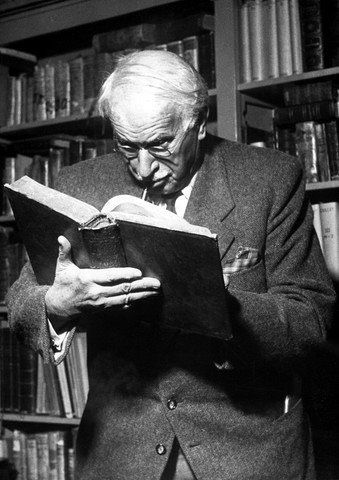破壊の巨大な力は人間の手に委ねられたのです。
問題は、それを使おうとする意志に抵抗し、その意志を愛と知恵の精神で和らげることができるかどうかである。
彼は、自分の力だけでそれを行うことはほとんどできないでしょう。
天国の "弁護者 "の助けが必要なのです。
つまり、神のもとに引き上げられた子供が、それまで断片的だった人間を「癒し」、完全なものにするのです。
人間の全体性、あるいは自己がそれ自体何を意味するとしても、経験的には、それは意識的な心の願いや恐れとは無関係に、無意識によって自発的に生み出される人生の目標のイメージである。
それは全人格的な人間の目標であり、意志の同意の有無にかかわらず、その全体性と個性を実現するためのものである。
このプロセスのダイナミズムは本能であり、それは、個人の人生に属するすべてのものが、本人の同意の有無や、自分に起こっていることの意識の有無にかかわらず、そこに入り込むことを保証するものである。
明らかに、自分が生きていることを知っているか、自分がやっていることを理解しているか、自分がやろうとしていること、あるいはやってしまったことの責任を受け入れているかどうかで、主観的に大きな違いが生じます。
意識的な認識とその欠如の違いは、すでに引用したキリストの言葉に端的に表れています。
「もし、あなたが自分のしていることを本当に知っているならば、あなたは祝福された者であり、もし、知らないなら、あなたは呪われた者である。
汝は呪われ、法を犯す者である」。
自然と運命の法廷では、無意識は決して言い訳として受け入れられず、それどころか非常に厳しい罰則があるのです。
それゆえ、すべての無意識的な性質は、意識の光を待ち望むと同時に、必死にそれと闘っているのである。
隠されていること、秘密にされていることを意識的に知ることは、確かに解決できない葛藤を私たちに突きつける。
しかし、夢の中で無意識から立ち上がる象徴は、むしろ対立するものの対決としてそれを示し、ゴールのイメージは、それらがうまく調和することを表している。
経験的に実証可能な何かが、私たちの無意識の奥底から助けに来てくれる。
そのヒントを理解するのは意識の仕事である。
もし、そうならなかったとしても、個性化のプロセスは継続する。
唯一の違いは、私たちがその犠牲者となり、逃れられないゴールに向かって運命に引きずられていくことです。このゴールは、もし私たちが自分の道を横切るヌーメンの意味を理解するために時間をかけ、忍耐強く行動していれば、直立歩行で到達できたかもしれません。
今本当に重要なことは、堕天使が手にした超人的な力に対抗するために、人間がより高い道徳的レベル、より高い意識の次元に登れるかどうかということです。
しかし、人間は自分自身の本性をもっとよく知らない限り、自分自身と一緒に進歩することはできない。
残念ながら、この点については恐ろしいほどの無知が蔓延しており、また、自分の本質的な性格についての知識を深めることも同様に大きな嫌悪感を抱いている。
しかし、今日、最も意外な方面で、人間の心理に関して何かすべきことがあるという事実を、もはや瞬きすることができない人々を見かけることがある。
残念ながら、「すべき」という小さな言葉は、彼らが何をすべきかを知らず、目標に至る道も知らないことを物語っている。
もちろん、私たちの祈りを聞いてくださる神の、報われない恵みに期待することはできます。
そのために、神は聖霊を通して、闇に満ちた被造物である人間、すなわち原罪に汚され、堕天使から神の術と科学を学んだ自然人を選ばれたのです。
罪のある人間は、この世から遠ざかり、生への貢ぎ物を拒否する罪のない人間ではなく、受肉し続けるための器として選ばれたのである。
黙示録以来、私たちは、神が愛されるべき存在であるだけでなく、恐れられるべき存在であることを再認識している。
神は私たちを善と悪で満たすが、そうでなければ恐れる必要はない。神は人間になろうとするのだから、その二律背反を人間の中で統合しなければならない。
このことは、人間に新たな責任を負わせることになる。
闇の神は原子爆弾と化学兵器を彼の手に滑り込ませ、同胞の被造物に対する終末論的な怒りの小瓶を空にする力を彼に与えたからである。
ほとんど神のような力を与えられたので、彼はもはや盲目で無意識のままでいることはできない。
彼は自分自身を理解し、それによって神のグノーシスを達成しようとするならば、神の本質と形而上学的なプロセスについて何かを知らなければならない。
-C.G.ユング『ヨブへの答え』第18章、paragraph. 745, 746, 747
アート - 「知の呪い
ヴァレンティン・ツルカン著
Everything now depends on man: immense power of destruction is given into his hand, and the question is whether he can resist the will to use it, and can temper his will with the spirit of love and wisdom.
He will hardly be capable of doing so on his own unaided resources.
He needs the help of an “advocate” in heaven,
that is, of the child who was caught up to God and who brings the “healing” and making whole of the hitherto fragmentary man.
Whatever man’s wholeness, or the self, may mean per se, empirically it is an image of the goal of life spontaneously produced by the unconscious, irrespective of the wishes and fears of the conscious mind.
It stands for the goal of the total man, for the realization of his wholeness and individuality with or without the consent of his will.
The dynamic of this process is instinct, which ensures that everything which belongs to an individual’s life shall enter into it, whether he consents or not, or is conscious of what is happening to him or not.
Obviously, it makes a great deal of difference subjectively whether he knows what he is living out, whether he understands what he is doing, and whether he accepts responsibility for what he proposes to do or has done.
The difference between conscious realization and the lack of it has been roundly formulated in the saying of Christ already quoted:
“Man, if indeed thou knowest what thou doest, thou art blessed: but if thou knowest not,
thou art cursed, and a transgressor of the law.”
Before the bar of nature and fate, unconsciousness is never accepted as an excuse; on the contrary there are very severe penalties for it.
Hence all unconscious nature longs for the light of consciousness while frantically struggling against it at the same time.
The conscious realization of what is hidden and kept secret certainly confronts us with an insoluble conflict; at least this is how it appears to the conscious mind.
But the symbols that rise up out of the unconscious in dreams show it rather as a confrontation of opposites, and the images of the goal represent their successful reconciliation.
Something empirically demonstrable comes to our aid from the depths of our unconscious nature.
It is the task of the conscious mind to understand these hints.
If this does not happen, the process of individuation will nevertheless continue.
The only difference is that we become its victims and are dragged along by fate towards that inescapable goal which we might have reached walking upright, if only we had taken the trouble and been patient enough to understand in time the meaning of the numina that cross our path.
The only thing that really matters now is whether man can climb up to a higher moral level, to a higher plane of consciousness, in order to be equal to the superhuman powers which the fallen angels have played into his hands.
But he can make no progress with himself unless he becomes very much better acquainted with his own nature.
Unfortunately, a terrifying ignorance prevails in this respect, and an equally great aversion to increasing the knowledge of his intrinsic character.
However, in the most unexpected quarters nowadays we find people who can no longer blink the fact that something ought to be done with man in regard to his psychology.
Unfortunately, the little word “ought” tells us that they do not know what to do, and do not know the way that leads to the goal.
We can, of course, hope for the undeserved grace of God, who hears our prayers.
But God, who also does not hear our prayers, wants to become man, and for that purpose he has chosen, through the Holy Ghost, the creaturely man filled with darkness—the natural man who is tainted with original sin and who learnt the divine arts and sciences from the fallen angels.
The guilty man is eminently suitable and is therefore chosen to become the vessel for the continuing incarnation, not the guiltless one who holds aloof from the world and refuses to pay his tribute to life, for in him the dark God would find no room.
Since the Apocalypse we now know again that God is not only to be loved, but also to be feared.
He fills us with evil as well as with good, otherwise he would not need to be feared; and because he wants to become man, the uniting of his antinomy must take place in man.
This involves man in a new responsibility.
He can no longer wriggle out of it on the plea of his littleness and nothingness, for the dark God has slipped the atom bomb and chemical weapons into his hands and given him the power to empty out the apocalyptic vials of wrath on his fellow creatures.
Since he has been granted an almost godlike power, he can no longer remain blind and unconscious.
He must know something of God’s nature and of metaphysical processes if he is to understand himself and thereby achieve gnosis of the Divine.
—C.G. Jung, 'Answer to Job, Chapter 18, paras. 745, 746, 747
Art • 'The Curse of Knowledge'
by Valentin Tsurkan


